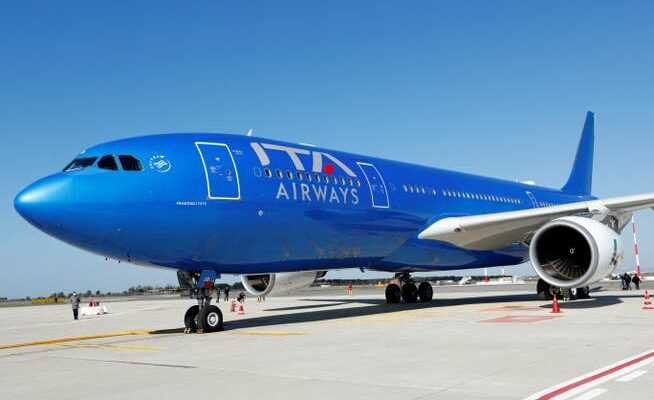Lufthansa bid together with MSC for Alitalia successor
The “Italia Trasporto Aereo”, internationally known under the name ITA Airways, is the successor to the ailing state airline Alitalia.
kca./(dpa)
The German airline group Lufthansa, together with the major shipping company MSC, wants to take over the majority in the successor to the Italian airline Alitalia. Together, the two companies submitted a binding offer for the Ita company to the Italian state on Monday, as Lufthansa confirmed to the German press agency on Monday (May 23). Italy wants to remain on board the greatly reduced airline with a minority even after the sale.
In the bidding process, which ended on Monday, the consortium of Lufthansa and the Swiss MSC was initially considered the favourite. Italy’s Finance Minister Daniele Franco said a few days ago that the sale should be completed by the end of June. Lufthansa regards Italy as its most important foreign market in Europe. In Rome, CEO Carsten Spohr advertised the concept of his many hubs (multi-hub) and airline brands. The gradual takeover and integration of companies such as Austrian, Brussels Airlines and Swiss could become a model for Ita. Rome, like Zurich, could also remain an important air traffic hub. Lufthansa is initially aiming for a minority stake. To the report.
Michael Pieper’s empire is doing well
df.
The Artemis Group, in which the investments of the Swiss billionaire Michael Pieper are bundled, more than tripled its profit in 2021 from 103 million to 314 million francs. The good earnings trend made it possible to reduce net debt from CHF 351 million to CHF 46 million. The equity ratio rose from 59 to 64 percent.
Artemis’ most important asset, the kitchen outfitter and coffee machine manufacturer Franke, increased its sales by 22 percent to CHF 2.6 billion, adjusted for exchange rate fluctuations as well as acquisitions and divestitures. The EBIT margin, which had been severely affected by the pandemic in the previous year, recovered from 3.6 to 6.6%.
Thanks to organic growth of 15 percent in the first quarter, Franke also got off to a good start in the current year. However, the war in Ukraine and the remaining effects of the pandemic are also a concern for the company from Aarburg and its parent company Artemis, which is also involved in the real estate sector, among other things, and holds significant stakes in the listed Swiss industrial companies Adval Tech, Arbonia, Autoneum and Forbo.
It is said that customers could order fewer products, mainly because of rising costs in a media release. As usual, Artemis does not provide a concrete outlook for the current year as a whole.
Starbucks is finally withdrawing from Russia
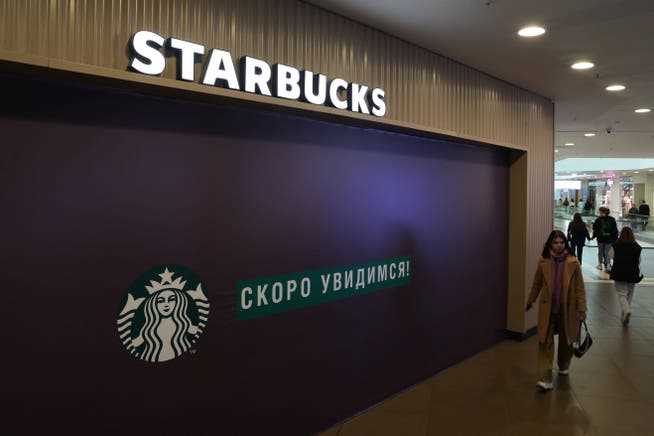
A closed Starbucks branch in the Russian city of St. Petersburg.
kca.
The world’s largest coffee house chain, Starbucks, wants to withdraw completely from Russia after around 15 years. “Starbucks has made the decision to exit and no longer have a brand presence in Russia,” the American company announced on Monday (May 23). As Starbucks announced, the approximately 2,000 employees should continue to be paid for six months and supported in the job search.
The coffee house chain operates 130 branches in Russia, which have been closed since March due to the Russian invasion of Ukraine. The branches are not to be reopened with the withdrawal from the Russian market. The group did not provide any information on the specific schedule and process of the withdrawal from Russia or on the financial details. Starbucks has had a presence in Russia since 2007.
Austria’s ex-Foreign Minister Kneissl gives up the Rosneft mandate
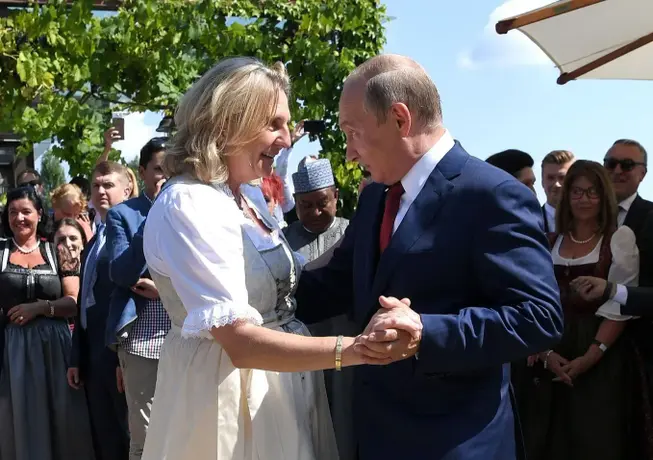
Austria’s then Foreign Minister Karin Kneissl danced with Russia’s President Vladimir Putin at her wedding in the summer of 2018.
ela. Karin Kneissl, former Austrian Foreign Minister, has resigned from the supervisory board of the Russian oil company Rosneft. This was reported by the Reuters news agency on Monday (May 23).
Last week, the EU Parliament spoke out in favor of sanctions against Kneissl and also the former German Chancellor Gerhard Schröder. Parliament’s step would have increased the pressure on the responsible EU Commission President, Ursula von der Leyen, and the Foreign Affairs Commissioner, Josep Borrell, to submit a proposal for Kneissl’s and Schröder’s inclusion on the EU sanctions list. If the proposal were accepted, the assets of the two former top politicians in the EU could have been frozen, as the Austrian news agency apa wrote.
Schröder and ex-Stasi officer Matthias Warnig had already resigned from the Rosneft board of directors on Friday.
Kneissl had been a member of the board of directors since the summer of last year. Had given speeches that the head of the Kremlin, Vladimir Putin, was invited to Kneissl’s wedding in 2018 and danced with her.
The Rosneft mandate is considered lucrative: according to media reports, Schröder is said to have drawn 600,000 euros a year.
At Comet, the boss is changing again
df.
The Freiburg-based technology company Comet is having trouble filling its executive board. American-British dual citizen Kevin T. Crofton has decided “for important personal reasons” to leave the company on September 1, 2022.
His term of office will thus be limited to two years, which was already the case for the former CEO René Lenggenhager. He had headed the management board from May 2017, but then abruptly resigned from his position in June 2019 – also citing “personal” reasons. Until Crofton was appointed, the Chairman of the Board of Directors, Heinz Kundert, held the position of CEO on an interim basis. Kundert, who, like 60-year-old Crofton, can look back on a long career as a manager in the semiconductor industry, has chaired Comet’s supervisory board since the end of April 2019.
Stephan Haferl has been appointed as the company’s new CEO. The Swiss-Norwegian dual citizen, who is 11 years younger than Crofton, has worked as a manager for Comet since 2007. Up to now, he has been President of the Industrial X-Ray Modules division, which includes the business with X-ray devices for use in airports, among other places, and thus the historical basis of Comet. In the meantime, however, Comet is primarily active as a supplier to the semiconductor industry.
Christine Lagarde thinks crypto is worthless – probably no more negative interest rates at the end of September
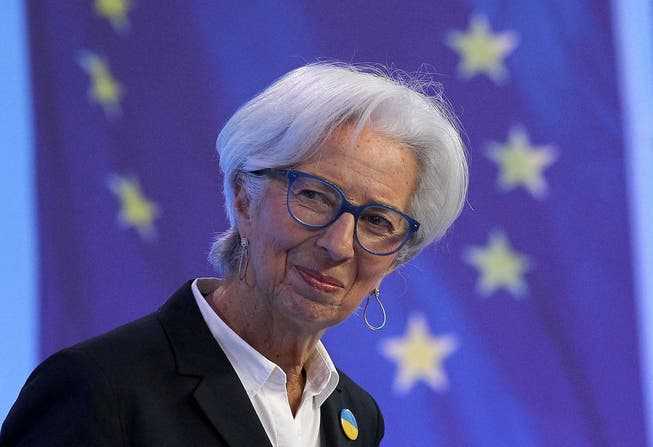
ECB President Christine Lagarde at a press conference in Frankfurt.
(Bloomberg) Christine Lagarde has advocated regulating cryptocurrencies to discourage people from speculating on them with their savings.
In an interview with Dutch television, the President of the European Central Bank said she was worried about people “who don’t understand the risks, who will lose everything and be terribly disappointed, so I think this should be regulated”.
Bitcoin and Ether are down 50 percent from last year’s highs following the recent turmoil in the digital currency market. Regulators are increasing their scrutiny of the sector amid concerns that it could pose threats to the broader financial system.
Lagarde expressed skepticism about the value of cryptocurrencies. “My very sober assessment is that cryptocurrencies are worth nothing, are based on nothing, have no underlying asset that acts as an anchor of security.”
The digital euro planned by the central bank is completely different. “The day we release the central bank digital currency, a digital euro, I will guarantee that the central bank is behind it, and I think it’s very different from a lot of those things,” Lagarde said.
In addition, the European Central Bank will probably start raising interest rates in July and leave the negative zone at the end of September, according to Lagarde.
US to consider abolition of Trump’s punitive tariffs on China
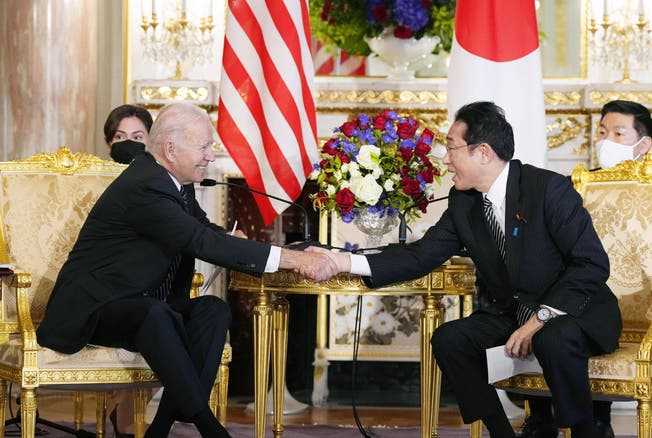
Joe Biden shakes hands with Japanese Prime Minister Fumio Kishida.
(dpa) In view of the high rate of inflation, the American government is examining the abolition of certain punitive tariffs on imports from China introduced by then-President Donald Trump. “I’m considering it. We haven’t imposed any of these tariffs, they were imposed by the last administration,” President Joe Biden said at a joint press conference with Japanese Prime Minister Fumio Kishida on Monday in Tokyo. Biden said he would discuss this with Treasury Secretary Janet Yellen after his return from Asia.
Yellen had already declared at the end of April that the government was doing everything in its power to lower the rate of inflation. This also includes a “careful” review of the trade strategy towards China. It is appropriate to review the tariffs because this would have “some desirable effects” in terms of inflation, Yellen said. It is therefore being examined whether some of the tariffs can be abolished again.
Trump imposed the first punitive tariffs on Chinese imports in 2018, starting a trade war between the world’s two largest economies. He wanted to reduce America’s high trade deficit with China and accused Beijing of unfair trading methods. Just one year later, almost all imports from China, worth more than $500 billion at the time, were subject to punitive tariffs. Beijing also responded with new taxes on US imports.
